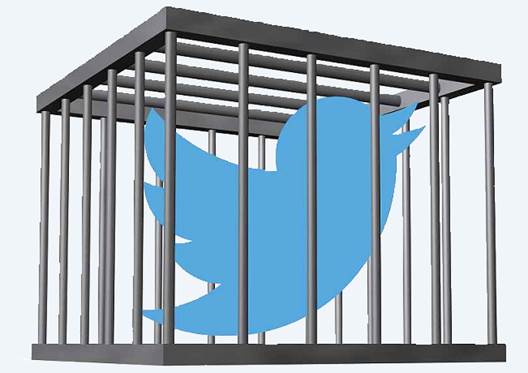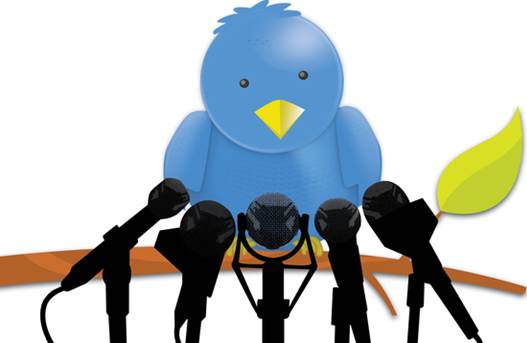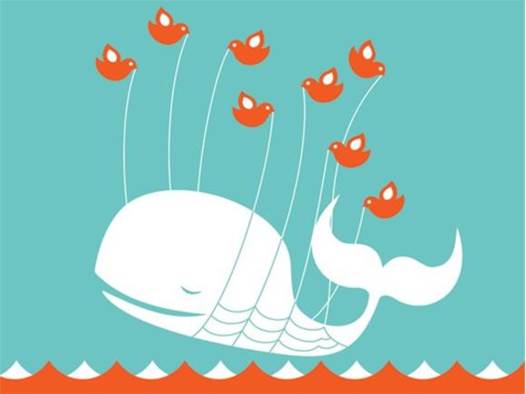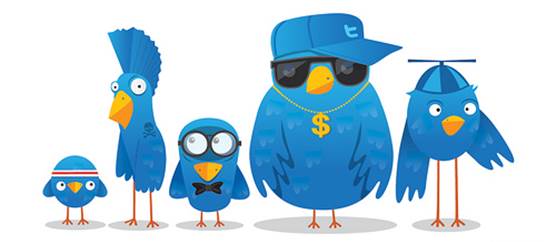Following recent high profile legal
landmarks surrounding Twitter, Mark Oakley ponders the impact on the world’s
biggest micro-blogging service
It’s difficult to remember a time before
Twitter. Though the micro-blogging service is still relatively young, the
Internet and our daily lives are awash with words like ‘tweet’, ‘tweeters’ and
‘trending’. The service has become a key marketing tool for creative types to
promote their wares to target audiences, television shows are now more
interactive than ever thanks to hash tags, while magazines and newspapers
regularly use Twitter to spread debate and find stories. Even our politicians
have adopted the platform, with Barack Obama’s simple victory acceptance tweet
‘ “four more years” - becoming the most rewetted ever.

As with most things, the more popular it
becomes the more it is scrutinized. One misstep by a celebrity moaning to the
world and they’re chastised in the press for not having the good grace to
accept all that celebrity brings, the good and the bad. Then you have the likes
of footballer Joey Barton, a regular target of Twitter abuse for his somewhat
forthright views.
Yet there is a side of Twitter everyone
seems to have ignored until recently. Users have typically viewed the service
as an extension of a private telephone call to a friend; a chat or a comment
which only their friends and colleagues would understand. There are all manner
of tweets sent every day, hurling abuse at others and laying out utterly
slanderous comments. While you could possibly get away with saying such things
down the pub, by passing it off as harmless banter, the whole world is in on
the joke on Twitter and now the part of the world that makes its living
enforcing libel law is fighting back.
Lies, DamnLies
The most recent high-profile case to beset
Twitter concerns Lord McAlpine, who following a BBC Newsnight programmer, which
alleged that a senior Conservative politician was part of systematic, organized
child abuse in North Wales was widely named as a pedophile on social media.
These accusations were later proven to be false, following an admission of
mistaken identity by the main source of the report.

This case is so interesting because, as
well as seeking damages for libel from the BBC (which have since been paid up)
Lord McAlpine’s legal team is also looking for legal settlements from everyone
on Twitter who wrongly accused him of child abuse. This includes various
well-known Tweeters users and many ordinary members of the public - including
thousands who rewetted accusatory statements. In total, over 10,000 Twitter
users have been identified by his lawyers in what could well turn out to be the
largest number of defendants in British legal history. Now, suddenly, Twitter
doesn’t quite seem like the messaging playground it once was.
Can He Do This?
Anyone who is in receipt of a legal letter
demanding an apology and a settlement figure might be asking if this is really
a justifiable reaction to messages on the free speech platform that is the
world wide web. As far as the legal experts are concerned, absolutely.
Leon Deakin, Associate at national law firm
Thomas Eggar LLP, says: “Twitter’s Terms of Service are pretty clear on the
responsibility for what users write and how it may be passed on beyond their
immediate network, clearly stating: “You understand that your Content may be
syndicated, broadcast, distributed, or published by our partners and if you do
not have the right to submit Content for such use, it may subject you to
liability.”

Ignorance is no excuse, either. “It appears
as though many users either have not read these terms or have acted without
necessarily thinking through the consequences of their actions. I have no doubt
that the message to think twice before you tweet will now be heeded by many
more users than before. If not, they will have no-one to blame but themselves.”
The worry for Twitter is that depending on
how widespread and successful legal action such as this is (and it’s worth
bearing in mind that other reports have claimed that Lord McAlpine has offered
Twitter users something of a get-out by issuing him with an apology and
donating $8 to charity), Joe Public could be left wondering whether it’s really
worth tweeting, or even retweeting, any slightly offensive but quite funny (in
their view) joke they heard about a celebrity just the other week. If they
decide against it, there is a real chance that Twitter could witness a negative
impact on its user numbers as people turn away. I’m not suggesting that Twitter
should be used to send offensive messages about, or to, anyone (it’s one of the
web’s rather nastier sides, frankly) but the reality is that a search for
various names on the service will come up with all manner of messages which can
be called into question - and it’s worth remembering that Twitter does have
past experience of users finding themselves in the dock.
Just A Joke
In January 2010, Paul Chambers famously
joked on Twitter that he was going to blow up Robin Hood airport in South
Yorkshire if it didn’t open again soon (the airport was under heavy snow
leading to its closure at the time). Some people clearly didn’t get the humor
and Chambers was arrested by anti-terror police, subsequently lost his job and
went through the courts several times over to clear his name.

With some high-profile help in the form of
the likes of comedian Al Murray and Stephen Fry, the case was eventually
dropped, some two years later, as the tweet was judged to have not been
menacing. Many questioned why this wasn’t the view in the first place, why
taxpayers’ money had been wasted on such a seemingly silly case, and where this
left the wider Twitter landscape in general. Twitter abuse hurled at Olympian Tom
Daley and footballer Fabrice Muamba have also hit the headlines in recent
months, but the need to be careful about what you tweet isn’t just a British
thing.
Earlier this year, an Indian man felt the
full force of the law when he became famous as the first person in India to be
arrested for a tweet. Ravi Srinivasan posted in October regarding one of the
country’s politicians, Karti Chidambaram, stating that he had “amassed more
wealth than Vadra”, referring to the son-in-law of a Party chief who was recently
cleared of irregularities relating to property deals. Unfortunately for
Srinivasan, Chidambaram didn’t go along with the joke, filing a police
complaint and tweeting in response “Free speech is subject to reasonable
restrictions. I have a right to seek constitutional/legal remedies over
defamatory/scurrilous tweets.”
In another recent case, an Indian web user,
this time a Facebook fan, was arrested for ‘Liking’ a post protesting against a
political rally. Despite the fact that the student didn’t write the original
post, just clicking ‘Like’ landed her in jail.
To Tweet Or Not To Tweet
All these cases call into question what you
should tweet and retweet. The important thing to remember at all times while
using a service like Twitter, and indeed any social media service, is that your
comments will be seen by your followers and, unless you protect your account,
the wider web community at large.

Lord McAlpine is unswerving in his wish to
pursue legal action against the Twitter-verse, telling Channel 4 News: “I’m
determined to make such an impact on the Twittering fraternity that they start
thinking about what they are saying. Children are victims of other children.
You can’t bully in the school yard any more, but you can bully through
Twittering.”
It’s difficult to deny that the general
concept underpinning Twitter actively encourages mindless statements and casual
retweeting, with an all-too-simple means of communicating with others in just a
few clicks. In doing so, I wonder if Twitter has unwittingly encouraged us all
to air our views no matter how inaccurate they may be, and in some cases that
is coming home to roost.
Of course, I don’t think freedom of speech
should be attacked nobody wants to live in fear of a police state and everyone
should have the right to be offensive but as the examples mentioned
demonstrate, in particular the Lord McAlpine case, people might start to take
far more care over what they write in 140 characters or less. Reputations can
be irreversibly damaged by a few misplaced words.
In Twitter’s own terms of service, the
following line reads: “What you say on Twitter may be viewed all around the
world instantly. You are what you Tweet!” Now, more than ever, that’s something
people should bear in mind.